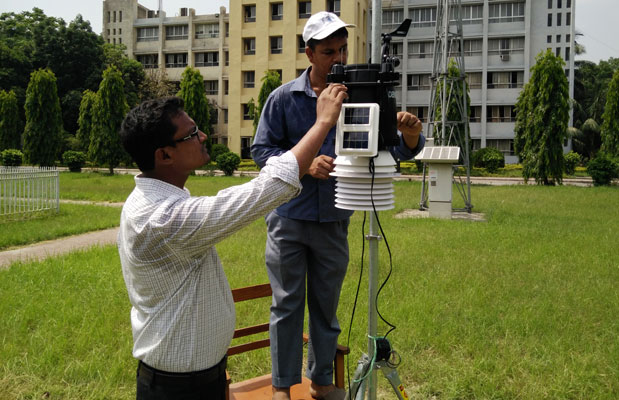Contact Person: Nabir Mamnun
Type: Seminar
 As a part of the HI-AWARE initiative, the Bangladesh Centre for Advanced Studies (BCAS) has installed an Automatic Weather Station (AWS) at the Bangladesh Meteorology Department (BMD) to monitor heat stress in Dhaka.
As a part of the HI-AWARE initiative, the Bangladesh Centre for Advanced Studies (BCAS) has installed an Automatic Weather Station (AWS) at the Bangladesh Meteorology Department (BMD) to monitor heat stress in Dhaka.
Urbanisation can exacerbate heat exposure for the poor in urban core areas. Due to the urban heat island effect, cities and urban areas experience higher levels of heat exposure than surrounding rural areas. Similarly, urban microclimates have a role to play in creating higher urban temperatures in certain parts of given cities. In addition, indoor temperatures can differ greatly from outdoor temperatures depending upon various building types and materials and surrounding environments. Unfortunately, temperatures are mostly recorded at standardised locations and in general do not cover the conditions in which the urban poor live. The HI-AWARE project is in the process of establishing a pilot study for monitoring in-house temperature vs. outdoor temperature, and identifying heat stress thresholds for devising effective heat management plans with all partners. The study is being conducted in New Delhi–India, Dhaka–Bangladesh and Faisalabad–Pakistan simultaneously. This study will help in devising urban settings to offset the effects of climate change and global warming.
As part of the urban heat coping study, the Bangladesh Centre for Advanced Studies (BCAS) is carrying out heat monitoring activities in Dhaka city with indoor and outdoor meteorological monitoring. BCAS is analysing different adaptation options for heat coping in Dhaka using a network of low-cost temperature-humidity sensors in various housing types in combination with outdoor meteorological stations. The outdoor meteorological stations include: (i) a mobile weather station (measuring temperature, humidity, wind speed and direction, and ultraviolet radiation) with which transects (with a car) are being conducted twice every Friday; and (ii) a DAVIS Vantage Pro2 Automatic Weather Station (AWS) (http://www.davisnet.com/weather/products/vantage-pro-professional-weather-stations.asp). The DAVIS Vantage Pro2 AWS has been installed at the meteorological complex of the Bangladesh Meteorological Department (BMD) in Agargaon, Dhaka.
BCAS will organise a half-day seminar on May 30, 2016 in the BMD meeting room in response to the latter’s requests about providing an interactive overview of HI-AWARE and the activities related to the “Monitoring of Urban Heat Coping Practices” under HI-AWARE. Expected participants are high level officials of the BMD.
The tentative programme of the seminar is as follows:
| Time | Activity |
| 10.00 – 10.15 | Welcome and Opening Remarks -Shamsuddin Ahmed, Director of BMD |
| 10.15 – 11.00 | About HI-AWARE -Md Abu Syed, Co-principal Investigator of HI-AWARE and Fellow, BCAS |
| 11.00 – 11.30 | Tea break |
| 11.30 – 12.15 | Monitoring of Urban Heat Coping Practices in Dhaka. -Nabir Mamnun, Senior Research Officer, BCAS |
| 12.15– 12.30 | Open discussion |
| 12.30– 12.45 | Closing Remark -Samarendra Karmakar, Former Director of BMD and consultant, BCAS |
| 12.45 | Vote of thanks -SM Tanvir Hassan, Research Fellow, BCAS |
